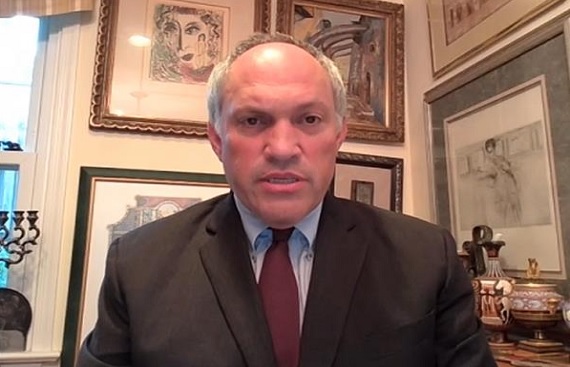India Should Be Embraced as an Ally, Not Treated as a Political Football: Ex-Pentagon Official
By
siliconindia | Wednesday, 11 June 2025, 04:46 Hrs

- Rubin stresses that Canada should embrace India as an ally rather than treat it as a political pawn.
- He criticizes Justin Trudeau's approach to India, describing it as 'virtue signaling and politics' rather than principled diplomacy.
- Rubin emphasizes the importance of Canada taking decisive measures to address Khalistani extremism and prevent it from undermining bilateral relations.
In a sharp rebuke of past Canadian policy, former Pentagon official Michael Rubin has asserted that India should be regarded as a crucial ally and not subjected to political maneuvering. Rubin, a senior fellow at the American Enterprise Institute, lauded the apparent shift in approach under Canadian Prime Minister Mark Carney, contrasting it with what he described as the detrimental policies of his predecessor, Justin Trudeau.
"India is not a football which you kick around. It is an ally to be embraced", Rubin stated, emphasizing the need for Canada to demonstrate genuine commitment and maturity in rebuilding its relationship with India.
Rubin's comments come at a time when relations between India and Canada have been strained, particularly following allegations surrounding the death of Hardeep Singh Nijjar, a Khalistani leader in Canada. The previous Canadian administration's handling of the situation drew criticism for allegedly amplifying exaggerated claims and prioritizing domestic political considerations over principled diplomacy.
"Mark Carney is working on repairing the relationship rather than following Justin Trudeau down the rabbit hole already shows that Prime Minister Carney is a much more serious person than the former Prime Minister of Canada," Rubin noted, suggesting a more constructive path forward.
Rubin criticized the previous Canadian leadership's approach to India, characterizing it as driven by 'virtue signaling and politics' rather than strategic considerations. He argued that India's importance to Canada necessitates a clear decision on whether to align with democracies like India and the United States or to allow China to exert undue influence.
"Canada's relationship with India, especially under Justin Trudeau, was not principled," Rubin asserted. "It was all virtue signaling and politics. The fact of the matter is that India is crucial to Canada, and Canada needs to decide whether ultimately it's going to side with the democracies like India and the United States, or whether it's going to posture the way Justin Trudeau did and allow China, which also has significant interests in Canada".
A key point of contention has been the issue of Khalistani extremism. Rubin has been a vocal critic of what he perceives as Trudeau's appeasement of radical Sikh extremists in Canada, accusing him of shifting blame to India rather than addressing domestic issues. He stressed the importance of decisive measures from Canada to address the Khalistan movement head-on.
"It is so essential that India continued to press Canada to address the Khalistan movement head-on to designate the Khalistan movement and extremists as terrorists, to uproot terror finance and to stigmatize forever these groups that really have no popular legitimacy back home in Punjab or for that matter, among the larger peaceful Sikh community in Canada", Rubin stated. He called for an end to allowing 'loud, extreme voices to win' and advocated for holding individuals involved in terror, tax fraud, and organized crime accountable.
Rubin reiterated his criticism of Trudeau, dismissing the narrative surrounding Nijjar and the Khalistan movement as exaggerations amplified for political gain. He suggested that Trudeau may have been willing to prioritize appeasing radical Sikh extremists over acknowledging and addressing domestic issues, potentially even attributing organized crime activities to external forces rather than internal problems.
In contrast, Rubin praised Indian Prime Minister Narendra Modi's decision to accept Canadian Prime Minister Mark Carney's invitation to the G7 Summit, viewing it as a sign that 'India has nothing to hide'. He believes Modi's magnanimity in attending the summit demonstrates a willingness to engage in serious dialogue and address concerns in a constructive manner.
"It makes sense for Prime Minister Modi to show that the problem was not Canada itself, but the immaturity and unprofessionalism of Justin Trudeau", Rubin added.
The American security expert highlighted that the Indian government is 'willing to have a serious dialogue, much like they had with the United States'. He emphasized the need for a two-way exchange, including discussions on illegal immigration into Canada, terror finance, and the links between the Khalistan movement and organized crime.
Rubin also raised concerns about the potential consequences of providing haven to terror groups, stating, "When you give haven to any terror group. Ultimately, your interests are going to be subverted". He argued that Trudeau's embrace and tolerance of the Khalistan movement undermined Canada's moral authority and strategic importance.
Rubin's remarks underscore the complex dynamics at play in the India-Canada relationship and the need for a more mature and principled approach to address shared challenges and opportunities. His call for Canada to embrace India as an ally reflects a broader recognition of India's growing global influence and its importance as a partner in addressing regional and international security concerns.
